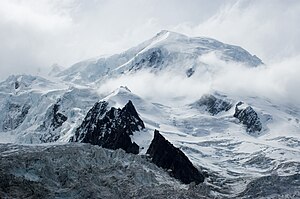Portal:European Union
Introduction
The European Union (EU) is a supranational political and economic union of 27 member states that are located primarily in Europe. The Union has a total area of 4,233,255 km2 (1,634,469 sq mi) and an estimated total population of over 448 million. The EU has often been described as a sui generis political entity (without precedent or comparison) combining the characteristics of both a federation and a confederation. Containing 5.8% of the world population in 2020, EU member states generated a nominal gross domestic product (GDP) of around US$16.6 trillion in 2022, constituting approximately one sixth of global nominal GDP. Additionally, all EU states except Bulgaria have a very high Human Development Index according to the United Nations Development Programme. Its cornerstone, the Customs Union, paved the way to establishing an internal single market based on standardised legal framework and legislation that applies in all member states in those matters, and only those matters, where the states have agreed to act as one. EU policies aim to ensure the free movement of people, goods, services and capital within the internal market; enact legislation in justice and home affairs; and maintain common policies on trade, agriculture, fisheries and regional development. Passport controls have been abolished for travel within the Schengen Area. The eurozone is a group composed of the 20 EU member states that have fully implemented the economic and monetary union and use the euro currency. Through the Common Foreign and Security Policy, the union has developed a role in external relations and defence. It maintains permanent diplomatic missions throughout the world and represents itself at the United Nations, the World Trade Organization, the G7 and the G20. Due to its global influence, the European Union has been described by some scholars as an emerging superpower. In 2012, the EU was awarded the Nobel Peace Prize. The United Kingdom became the only member state to leave the EU, in 2020; ten countries are aspiring or negotiating to join it. (Full article...) Selected article While most of the states in the world, and in Europe, are republics (have a directly or indirectly elected head of state), there are still six monarchies in the European Union, whose head of state (a monarch) inherits his or her office, and usually keeps it for life or until they abdicate. At the dawn of the 20th century, France was the only republic among the future member states of the European Union; the ascent of republicanism to the political mainstream only started at the beginning of the 20th century. The European Union's monarchies are: the Kingdom of Belgium, the Kingdom of Denmark, the Grand Duchy of Luxembourg, the Kingdom of the Netherlands, the Kingdom of Spain, and the Kingdom of Sweden. All six monarchies in the European Union are constitutional monarchies, which means that the monarch does not influence the politics of the state: either the monarch is legally prohibited from doing so, or the monarch does not utilise the political powers vested in the office by convention. There is currently no major campaign to abolish the monarchy in any of the remaining six states, although there is a significant minority of republicans in all of them. Selected picture
Photo credit: Nattfodd The top of Mont Blanc, the European Union's highest mountain, seen from the Gare des Glaciers.Did you know?...that France possesses the largest exclusive economic zone (EEZ) in the world? ...that Monaco, San Marino, and Vatican City all mint their own euro coins, with their own national symbols on the back? ...that Turkey's two most famous weightlifters, Naim Suleymanoglu and Halil Mutlu are only two of four weightlifters in the world to have won 3 gold medals in 3 olympics? Selected cityBrussels is the capital of Belgium, of the French Community of Belgium, of the Flemish Community, and is the headquarters of the European Union's institutions. Brussels is in the centre of Belgium, and also the largest municipality of the Brussels-Capital Region. This municipality inside Brussels is correctly named The City of Brussels, which is one of 19 municipalities that make up the Brussels-Capital Region, with a total population of 1,018,804 inhabitants (1 January 2006). The municipality has a population of about 140,000. The Metropolitan area has about 2,090,000 inhabitants. Brussels is also the political seat of NATO, the Western European Union (WEU) and EUROCONTROL, the European Organisation for the Safety of Air Navigation. In 977 AD, the Holy Roman emperor Otto II gave the duchy of Lower Lotharingia on the empire's western frontier to Charles, the banished son of King Louis IV of France. Mention was already made of Brussels at the time: Bishop Saint-Gery of Cambrai-Arras settled a chapel on a small island (695). However, the founding of Brussels is usually said to be when a small castle was built by Charles around 979 on Saint-Géry island in the Zenne or Senne river. General imagesThe following are images from various European Union-related articles on Wikipedia.
TopicsFeatured contentFeatured articles
Featured lists
Featured contentGood articles
CategoriesRelated portalsAssociated WikimediaThe following Wikimedia Foundation sister projects provide more on this subject:
Discover Wikipedia using portals |































































